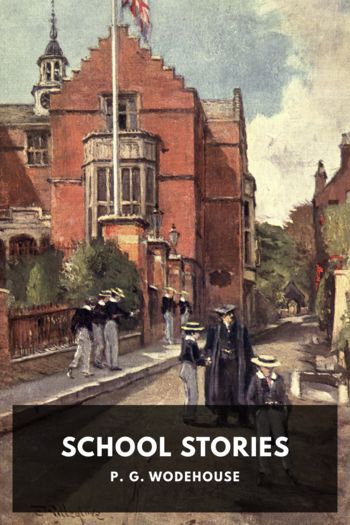School Stories - P. G. Wodehouse (best e book reader TXT) 📗

- Author: P. G. Wodehouse
Book online «School Stories - P. G. Wodehouse (best e book reader TXT) 📗». Author P. G. Wodehouse
“Well, I don’t see what we can do,” said Linton, “except keep on going to Cook’s ourselves. Let’s be going now, by the way. We’ll get as many chaps as we can to promise to stick to them. But we can’t prevent the rest going where they like. Come on.”
The atmosphere at Cook’s that evening was heavily charged with gloom. Ex-Sergeant Cook, usually a treasury of jest and anecdote, was silent and thoughtful. Mrs. Cook bustled about with her customary vigour, but she too was disinclined for conversation. The place was ominously empty. A quartette of school house juniors in one corner and a solitary prefect from Donaldson’s completed the sum of the customers. Nobody seemed to want to talk a great deal. There was something in the air which
said as plain as whisper in the ear,
“The place is haunted.”
and so it was. Haunted by the spectre of that hideous, new, glaring redbrick building down the street, which had opened its doors to the public on the previous afternoon.
“Look there,” said Dunstable, as they came out. He pointed along the street. The doors of the new establishment were congested. A crowd, made up of members of various houses, was pushing to get past another crowd which was trying to get out. The “public-school tea at one shilling” appeared to have proved attractive.
“Look at ’em,” said Dunstable. “Sordid beasts! All they care about is filling themselves. There goes that man Merrett. Rand-Brown with him. Here come four more. Come on. It makes me sick.”
“I wish it would make them sick,” said Linton.
“Perhaps it will. … By George!”
He started.
“What’s up?” said Linton.
“Oh, nothing. I was only thinking of something.”
They walked on without further conversation. Dunstable’s brain was working fast. He had an idea, and was busy developing it.
The manager of the Wrykyn Branch of Ring’s Come-one Come-all Stores stood at the entrance to his shop on the following afternoon spitting with energy and precision on to the pavement—he was a freeborn American citizen—and eyeing the High Street as a monarch might gaze at his kingdom. He had just completed a highly satisfactory report to headquarters, and was feeling contented with the universe, and the way in which it was managed. Even in the short time since the opening of the store he had managed to wake up the sluggish Britishers as if they had had an electric shock.
“We,” he observed epigrammatically to a passing cat, which had stopped on its way to look at him, “are it.”
As he spoke he perceived a youth coming towards him down the street. He wore a cap of diverse colours, from which the manager argued that he belonged to the school. Evidently a devotee of the advertised “public-school” shillingsworth, and one who, as urged by the small bills, had come early to avoid the rush. “Step right in, mister,” he said, moving aside from the doorway. “And what can I do for you?”
“Are you the manager of this place?” asked Dunstable—for the youth was that strategist, and no other.
“On the bull’s eye first time,” replied the manager with easy courtesy. “Will you take a cigar or a coconut?”
“Can I have a bit of a talk with you, if you aren’t busy?”
“Sure. Step right in.”
“Now, sir,” said the manager, “what’s your little trouble?”
“It’s about this public school tea business,” said Dunstable. “It’s rather a shame, you see. Before you came barging in, everybody used to go to Cook’s.”
“And now,” interrupted the manager, “they come to us. Correct, sir. We are the main stem. And why not?”
“Cook’s such a good sort.”
“I should like to know him,” said the manager politely.
“You see,” said Dunstable, “it doesn’t so much matter about the other things you sell; but Cook’s simply relies on giving fellows tea in the afternoon—”
“One moment, sir,” said the man from the States. “Let me remind you of a little rule which will be useful to you when you butt into the big, cold world. That is, never let sentiment interfere with business. See? Either Ring’s Stores or your friend has got to be on top, and, if I know anything, it’s going to be We. We! And I’m afraid that’s all I can do for you, unless you’ve that hungry feeling, and want to sample our public-school tea at twenty-five cents.”
“No, thanks,” said Dunstable. “Here come some chaps, though, who look as if they might.”
He stepped aside as half a dozen School House juniors raced up.
“For one day only,” said the manager to Dunstable, “you may partake free, if you care to. You have man’s most priceless possession, Cool Cheek. And Cool Cheek, when recognised, should not go unrewarded. Step in.”
“No thanks,” said Dunstable. “You’ll find me at Cook’s if you want me.”
“Kindness,” said he to himself, as Mrs. Cook served him in the depressed way which had now become habitual with her, “kindness having failed, we must try severity.”
Part IIThose who knew and liked Dunstable were both pained and disgusted at his behaviour during the ensuing three days. He suddenly exhibited a weird fondness for some of Wrykyn’s least deserving inmates. He walked over to school with Merrett, of Seymour’s, and Ruthven, of Donaldson’s, both notorious outsiders. When Linton wanted him to come and play fives after school, he declined on the ground that he was teaing with Chadwick,





Comments (0)